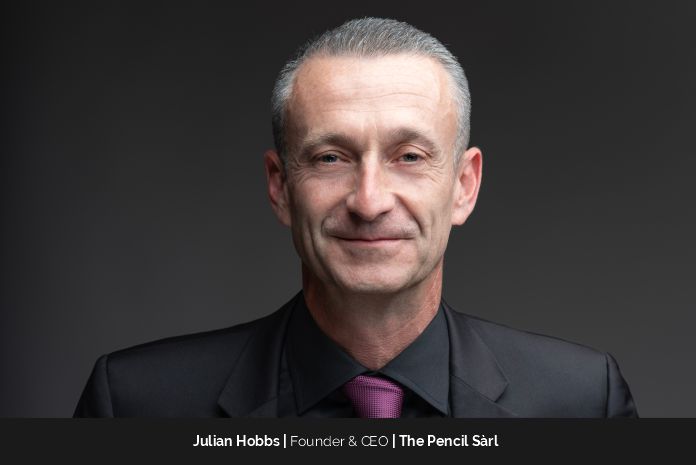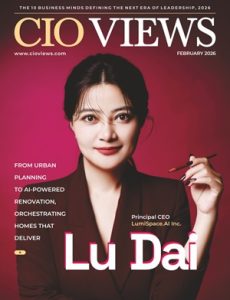“My role today is less about execution alone and more about ensuring each experiment contributes to clarity,” says Julian Hobbs, Founder & CEO of The Pencil Sàrl. The sign of a true visionary builder. Now, the question is: what kind of clarity is Julian talking about? Clarity about the future workplace and must-have skills. For him, trust is the currency to run any business successfully. Therefore, above all, he wants to clarify how AI can restructure productivity without eroding trust.
His role as founder has evolved since starting The Pencil. What was once broad now channels to impact. Julian wore every hat from designer and developer to strategist and communicator. Although these functions haven’t changed much, direction has crystallized. It is the lens through which he prioritizes his actions. “Instead of focusing on how fast we can build,” he notes, “I focus on what we should build.”
The Inception of The Pencil
True to its name, The Pencil was born to write a fresh chapter of AI-run projects. Julian noticed a gap. AI is impressive in speed and scope. However, the effectiveness was not up to the mark. The reasons were evident to him. Over 80% of solutions are either poorly designed, impractical, or misaligned with the requirements of real people and businesses.
They often chase only the hype, failing to address the basic question: ‘What problem are we solving?’ Trust and privacy were taking a backseat. Julian wanted to reset this. How? By approaching things differently. The Pencil was launched in Switzerland. A progressive country where precision and thoughtful innovation are part of the culture. The company’s mission is to create AI agents that are practical, private, and empowering.
Instead of scaling too quickly, The Pencil colors outside the lines. It focuses on experimentation, testing what the future workspace could look like in an AI-first world.
Intentional Work-life Balance
Julian’s inclusion in ‘Europe’s 10 Most Influential Business Leaders to Watch in 2025’ is a marker of his prowess. In an experimental and AI-accelerated environment, he maintains his pace. Finding all the answers at once can never be practical. It only leads to burnout and professional dissatisfaction. Julian knows that too. Hence, he chooses the right pace for the right priorities. Deliberate pauses restore his energy. To Julian, “Reflection is as valuable as execution.” This simple yet powerful mindset helps him to strike a better work-life balance. It also makes sure that their work is intentional, not just reactive.
The Road, not The Roadblocks That Matter!
The business world is never free of unexpected challenges. The tricky part is that you either have to find a solution, take the risk, or leave the sector. One challenge that has tested Julian’s resilience is navigating uncertainty in AI. Reports consistently highlight that between 70% and 80% of AI initiatives fail to deliver ROI. Weak technology is not the reason. Failure occurs because the problems aren’t well represented.
It has not been as easy as it sounds. However, Julian is not someone who can be deterred by uncertainty. Rather than treating it as a threat, he has reframed it as part of the journey. His never-give-up attitude is also reflected at The Pencil. Failure has a different meaning to them. Of course, not a wasted effort, but a data point. Every prototype, even if flawed, gives them more insight into long-term viability. This outlook has built resilience in Julian and influenced their overall approach to the mission.
Drawing With Direction
Originality and alignment are the nucleus for a pioneering spirit at The Pencil. The former thrives when people are free to experiment. But the latter comes from anchoring everything in the company’s mission. The intent is to empower all people by redefining how they engage with AI, ensuring it is accessible, safe, private, and purposeful.
CEO Julian highlights that their mission is their compass. It assures that regardless of the creativity of an idea, it aligns with the vision of a workplace where people feel supported, not replaced.
What’s Next?
One of his proudest experiments is their work on AI agents across domains like sales, service, finance, and human resources. Julian doesn’t count them as productivity tools. But instead, he deems them as stepping stones toward a very different workplace. When asked how the future workplace will look, he anticipates ‘nothing like it does today.’
Traditional systems such as ERPs and CRMs will be rendered obsolete. They will be replaced, he indicates, by new user experiences driven by natural AI interactions, new systems of record built on blockchains, and data foundations powered by lakehouses. The new AI-driven systems will put an end to the fragmented IT problems. The stubborn problems of moving data around, duplicating it, or trying to make siloed apps talk to each other will eventually fade. So will the endless integration projects, reports that don’t match across systems, and rigid workflows that trap organizations in outdated ways of working. Julian adds that as decentralized systems of record become the norm, these barriers will dissolve. For The Pencil, the agents it is building aren’t just test cases. They are early signs of how work itself will be reshaped in an AI-first world.
Staying Ahead with a Swiss Edge
This technopreneur stays plugged into global research and the startup world but filters every new trend through one test: does it solve a real problem? If not, it’s not worth pursuing.
Julian also credits Switzerland for giving The Pencil a unique advantage. The country has become a hub for AI, with EPFL and ETH Zurich driving breakthroughs, national initiatives like the Swiss AI Initiative, and solid infrastructure such as the Alps supercomputer.
Julian underlines that a big milestone was the launch of Apertus. This is an open-source, multilingual LLM that supports over 1,000 languages. Developed by EPFL, ETH Zurich, and CSCS, it exemplifies the country’s values of openness and inclusivity. It was trained only on public data, with strict safeguards for privacy and ethics.
For Julian, being part of this ecosystem means tapping into the collective consciousness. It solidifies the fact that The Pencil doesn’t build in isolation. Instead, it grows in constant dialogue with one of the world’s most forward-looking AI communities. That’s how he keeps the company relevant. Being grounded in real human needs and shaped by Switzerland’s culture of innovation.
The Future is AI-driven, NOT Human Outrun
“AI can be a multiplier, not a replacement.” This is what CEO Julian hopes The Pencil will show the next generation of creative entrepreneurs. He indicates that the world they will enter will demand new skills such as AI literacy, critical thinking, and ethical design. Specific skills that were once considered critical may no longer hold the same weight.
However, these budding entrepreneurs will need much more than technical skills to make their mark. Empathy, adaptability, collaboration, and communication are the traits for tomorrow’s leaders. Something that AI cannot replace. But it can indeed amplify when combined with literacy and critical thinking.
Julian quotes the words of Nvidia’s CEO Jensen Huang, “You’re not going to lose your job to AI, but you’re going to lose your job to someone who uses AI.”
It won’t be human vs AI. Instead, it will be a co-existence. This very principle captures why The Pencil’s work matters. The smart collaboration of people and technology changes the game.
Discussing further, Julian shares a very interesting point. If The Pencil succeeds, its impact will be to demonstrate that future entrepreneurs don’t need vast resources. What they require is clarity, creativity, and the ability. To what? To leverage AI. “With the right AI approach,” Julian feels, “small, focused teams can achieve breakthroughs that were once reserved for large corporations.”
Advice for The Next Trailblazers
To someone starting in the AI-driven creative or business space who wants to build something lasting, Julian recommends adopting mindfulness. “Don’t rush to scale. Rush to understand,” he advises. The tech veteran has observed a typical pattern in the failure of too many AI projects. They never stop to ask why. What problem am I solving? Who benefits? What skills will this make obsolete, and which will it elevate?
Again, it all comes down to the same thread, clarity. Without it, everything will fall apart like a house of cards. To build something authentic and lasting, the aspiring techpreneurs must master their intention. And particularly for those who are from or in Switzerland, this place is a blessing. Julian urges these aspirants to lean into the incredible ecosystem here. The Swiss tech arena is a model of how collaboration and openness can accelerate innovation responsibly.
Success with Substance
When he started, Julian had a pretty different definition of success than what he has now. He equated it with visibility and scale. Fast forward to today, success equals clarity and contribution.
Getting deeper into that topic, he shares an excellent example. At The Pencil, success is when a prototype teaches us something about the workplace of tomorrow. Otherwise, it can also be feedback from a user who feels truly empowered by their tools.
The picturesque beauty of Switzerland attracts tourists from around the world. On the flip side, the techy side of the country offers a knowledge hub for the quiet revolutionaries. It reminds them through its innovation culture that precision is not about speed. It’s about the pace at which one can get it right. That philosophy has inspired how Julian gauges success.
Patience as a Superpower
A leadership quality he has had to develop over time that now plays a key role in how Julian runs The Pencil is ‘patience.’ In a high-growth industry, it’s tough to resist the temptation to chase everything. However, Julian learned the power of patience. He has realized that leadership is not about doing more. The leader must know how to do the right things at the right time. The ability to slow down, to create space for reflection, and to ensure that decisions are the major takeaways in this endeavor. The mantra here is to stay intentional rather than being frenzied. This patience doesn’t slow anything down at The Pencil. Instead, it strengthens the entire process from people to performance.
By cultivating patience, Julian ensures they don’t burn energy on noise but invest in what truly aligns with their mission.
Progress without Sacrificing Identity
Rapid experimentation and innovation without losing sight of a brand’s core identity is no ordinary challenge. Sticking to The Pencil’s mission, everything is done. They only pursue AI that helps people in meaningful, secure, and inclusive ways. Things that resonate with this objective are being carried forward. If something doesn’t toe the line, it gets discarded, regardless of its short-term potential.
“Intelligent failure” and “fail fast” are two creative principles that guide actions at The Pencil. CEO Julian shares that these two things are their go-to problem solvers when experiments don’t succeed. Treating failure as a growth engine, they generate insights that accelerate the next iteration. This disciplined method drives innovation forward without compromising who The Pencil is.
Leading the Next Leap
Julian reveals that the coming year will be focused on testing, in real terms, what the workplace of the future will look like. AI is already changing jobs, redefining valuable skills, and transforming how companies operate. His own job role is advancing to one that he is excited about. Leading experiments that test these shifts in practice may not be a cakewalk, but it will be worth the persistence. “My role will evolve from builder to connector,” Julian remarks, “linking our experiments to users, businesses, and institutions.” By doing this within Switzerland’s world-class AI ecosystem, Julian can figure out what truly works before scaling it.
Lastly, the sagacious businessman also lays out the company’s philosophy. First, experiment; then, validate; then, scale; and finally, mature. This staged approach makes sure that when The Pencil grows, it does so deliberately and with real impact.





